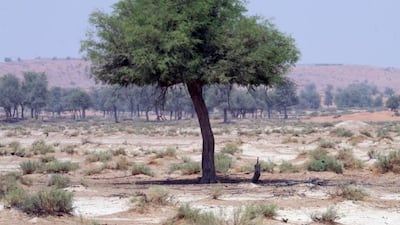ABU DHABI // Supplies of groundwater could run out by 2030 because of demand from agriculture, scientists have warned.
The water table level in parts of the country has fallen by as much as 60 metres, according to a study by UAE University.
Groundwater is the UAE’s main conventional water resource. The agricultural sector is the largest water consumer, using about 34 per cent of the total.
The domestic and industrial water sectors use 32 per cent, forestry 15 per cent and amenities 11 per cent, with losses accounting for 8 per cent.
“The groundwater level has declined from 60 metres to 80 metres in Al Hamaranyah and Jabal Al Heben in the Northern Emirates due to intensive agriculture activities,” said Ad Spijkers, regional head of the United Nations Food and Agriculture Organisation.
“Also, recent data from the Environment Agency Abu Dhabi showed that the water level of Al Khazna, west of Al Ain, declined from 56 metres in September 1999 to 96 metres in January 2014. The water level in Sweihan also declined, from 46 metres in December 1998 to 104 metres in January 2013.”
Groundwater supplies about 51 per cent of the country’s needs, mostly for irrigation, with a limited quantity used for drinking in the Northern Emirates.
Desalinated water supplies about 37 per cent, mainly for drinking, and for irrigation in some areas. Reclaimed water – or treated wastewater – accounts for 12 per cent and is mainly used for irrigating amenities.
“Based on cultural and religious thoughts, treated domestic wastewater is not used in the UAE for crop production,” the study says.
“Although there is currently increasing interest in using this valuable resource.”
Mr Spijkers said feasibility studies on treated wastewater were under way.
“The emirate of Abu Dhabi has started using it on 240 sample farms and has plans to irrigate an additional 3,000 farms in the future,” he said. “Water security is priority number one in the UAE.”
Although the UAE Water Conservation Strategy pictures a future in which groundwater resources are kept constant at 2.3 million cubic metres per year, the study found that 2030 could be the first year with no groundwater resources.
“The figures don’t surprise as much as cause me grave concern,” said Nicholas Lodge, managing partner at Clarity, an agriculture consultancy in Abu Dhabi.
“Water security is intrinsically linked to food security, and the UAE and other countries with similar climate and natural water resources have an already acute shortage and can only expect things to get worse.
“The usage of water in agriculture is a matter of national importance and really significant reduction will be necessary – something the Government is taking steps to implement.”
The study, The Challenges of Water Scarcity and the Future of Food Security in the UAE, was conducted by Suzan Shahin, a PhD candidate in the aridland agriculture department at UAEU, and Dr Mohammed Al Yafei, the assistant dean for research and student affairs at the college of food and agriculture.
cmalek@thenational.ae

